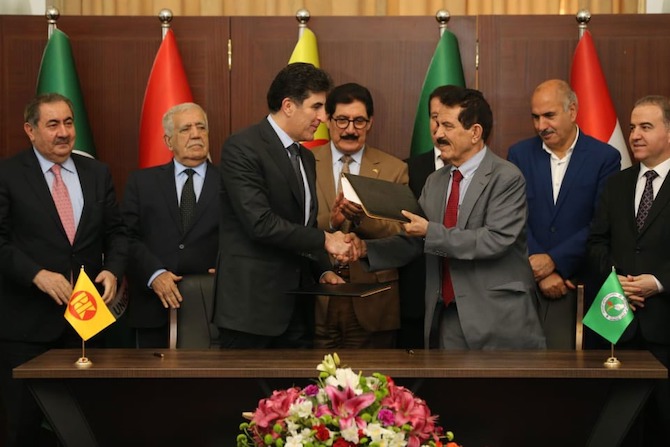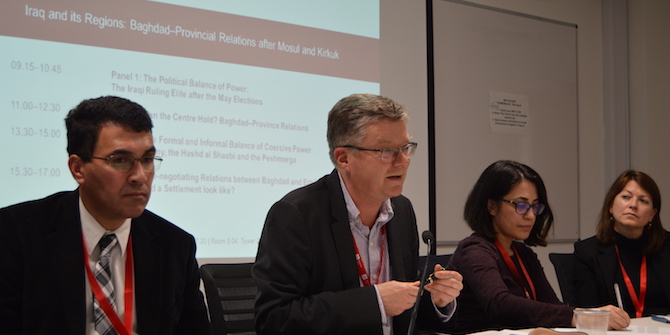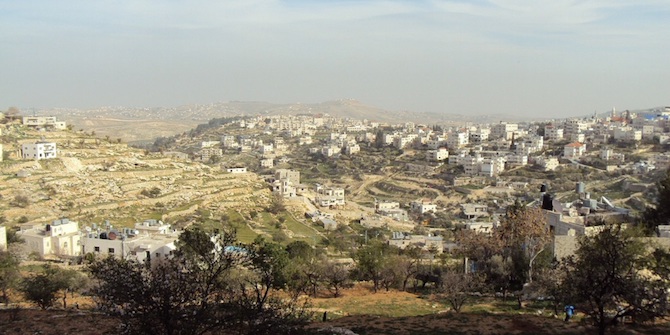by Zmkan Ali Saleem & Mac Skelton

The violence and political instability of the post 2003 era has generated a shifting set of alliances and blocs throughout much of Iraq, with the exception of the Kurdish region, which has witnessed a repeated reassertion of the longstanding norm: The region is co-ruled by a two-party duopoly under two powerful families – with the Barzanis controlling Erbil and Dohuk, and the Talabanis controlling Sulaimani while also exerting outsized influence over Kirkuk. The two parties have retained separate spheres of influence while also partially coordinating budgets and administrative systems in the name of Kurdish unity. What is the source of this remarkable consolidation of power – which has led to the appearance of overall political stability? The aim of this piece is to understand this question primarily from the standpoint of political economy: Rather than Kurdish nationalism or identity, the most powerful glue that binds the region together is a system of resource distribution and patronage. A quota-based allocation of resources and government positions – known throughout Iraq as the muhassasah system – is pervasive across all political factions in the country; however, in the KRG such an arrangement has always been organised around party interests rather than ethno-sectarian or identarian features. Our objective is to lay out how and why this system reproduces itself amidst immense pressure.
Origins of Kurdish muhassasah
A nascent system of muhassasah emerged following the anti-regime uprising of 1991. While most reports indicated that the KDP had won a slight majority in the initial elections of 1992, neither side would accept the other’s victory. Eventually a deal was made between Masoud Barzani and Jalal Talabani: the positions and the corresponding budgets would be split 50/50 – a no competition muhassasah system structured around ensuring that neither side would end up powerless. This system quickly broke down due to scarcity. Cut off from Baghdad’s budget and under international sanctions, neither party had the funds to deliver essential services. In this context, the PUK sensed an imbalance, alleging that that the KPD was not disclosing all revenues, particularly from the border crossing with Turkey. Consequently, the Sulaimani-based party gradually ramped up the pressure for their Erbil neighbours to reveal the true extent of their earnings. When the KDP refused, PUK forces removed the KDP from Erbil in 1995 and asserted military dominance over the extended region. The Kurdish civil war (1994–6) was at its root a conflict over the terms of muhassasah.
The suspicions directed towards the KDP had much to do with the party’s dominance over the Ibrahim Khalil border crossing with Turkey. During the 1990s, the region became a major transit and smuggling route, with oil from the provinces under the former Ba’ath regime passing through Erbil and Dohuk towards Turkey, and vice versa. The coordination between the KDP leadership and the regime around oil smuggling generated significant revenues for the Barzanis. Moreover, the KDP informally imposed customs on all oil imports through the border crossing. The PUK was certain that they had not received their fair share of these revenues, and they were willing to go to war to secure their claim.
Stabilisation of the Duopoly
When the KDP was finally able to regain control of Erbil with the help of Saddam’s forces in 1996, two different governments emerged – one in Sulaimani and another in Erbil. The political configuration would remain up through the invasion of 2003. Despite the fact that neither government was capable of ensuring reliable services to the populace, their popularity was not meaningfully threatened. Extreme poverty gave Kurds no choice but to latch onto one of the two major political parties – the only institutions in the region with any measure of consolidated resources. This was a patronage system founded upon a deprivation relationship.
Between 1996 and 2003, fears of a new intra-Kurdish conflict remained among the international community. While US-led diplomatic efforts between the two parties generated external pressure for reconciliation, the fragile peace that emerged had more to do with economic stability than diplomatic skill. The Oil for Food Program injected money and resources into both parties. (The KRG received 13 percent of the total budget.) As the UN lacked personnel and technical capacity on the ground, the elaborate food distribution system and construction contracts would be provided by local Kurdish companies and contractors. The contracts were generally allotted to those under the control of the two parties, providing much needed cash and economic movement.
The region witnessed gradual stabilisation. The incentives for business outweighed whatever gains could be obtained through violence. The two parties extended their patronage networks, even directing salaries and resource to nascent opposition groups. The groundwork was now laid for the two parties to receive and administer the enormous influx of cash that would come with the 2003 invasion.
The 2003 Invasion and the Emergence of State Revenue
In 2003, the Kurdish region witnessed a huge injection of external support. The Coalition Provisional Authority (CPA) granted the Kurdish region a significant share of federal oil revenues during a period in which worldwide crude prices were rising. The 2005 constitution cemented this economic relationship between centre and periphery, with the Kurdish region receiving 17 percent of the total federal oil revenues. The display of Kurdish unity during this period must be understood through the prism of the emerging post-2003 distribution of resources. Talabani and Barzani sought to convince the international community that intra-Kurdish conflicts were over and thus the region was worthy of serious and sustained investment, and moreover they sought to put guarantees in place that would prevent each other from encroaching on each other’s sphere of influence. A renewed 50/50 muhassasah emerged.
This muhassasah was distinct from previous periods. Not only would revenues and positions be equally split, but also it was agreed that neither side would criticise the other in the local or international press. A joint party committee monitored all media outputs. In 2005 and again in 2009, the two parties ran on common lists in the regional and national elections. While this repeated affirmation of Kurdish accord had broad appeal at home and abroad, among certain segments of the Kurdish populace the harmony raised concerns. A nascent reform movement increasingly alleged that the post-2003 muhassasah directed money and positions to a limited network of party affiliates. Nawshirwan Mustafa left the PUK and ran a reform list in the 2009 regional elections as the Gorran Party. Ultimately however the economic interdependence of the KDP and PUK brought the leaders of the two parties together against the reformers, and they resorted to violence, promises of reform, and nationalist rhetoric to side-line the movement.
The Shocks of Oil, ISIS, and the Referendum
The oil revenue crisis of 2014 placed unprecedented stress on the Kurdish political-economic order. In order to understand the significance of this critical moment, it is important to grasp the power structure governing the oil economy in the KRG. For years, the KDP had been building up oil institutions and infrastructure, exerting full control over the Natural Resources Ministry. The PUK ceded this ground in exchange for an even split of the revenues. Not only did this arrangement place the entire technical apparatus of the oil industry in the KDP’s hands, it also enabled the Barzanis to make essentially unilateral decisions around oil sales and exports without PUK input. With the KRG-Turkey pipeline finally completed in 2013, the KDP quickly moved to initiate exports to Turkey, justifying its actions in the vagueness of constitutional frameworks around regionalism and oil.
Nouri Al Maliki’s response was swift, cutting the region off from its 17 percent allotment of federal revenues. Simultaneously, an abrupt drop in global oil prices slashed the anticipated earnings from oil exports. By 2015 the KRG was unable to pay salaries. By April of the same year, the region was $17 billion in debt, forcing the government to borrow massively. The revenue from Baghdad had accounted for 80 percent of the KRG’s budget. The disastrous fallout of the independence referendum further threatened revenue sources. Some analysts speculated that the duopoly would not survive these pressures.
These judgements were understandable but premature. As in the period of scarcity during the 1990s, the two parties remained the only game in town. No other political entity was capable of extending contracts, benefits, and cash. In addition to considerable pressure from the international community, the election of May 2018 created incentives for Haider Al-Abadi to restore the salaries of KRG employees in the hopes of entering the vote with all major crises settled. With the money flowing again, both parties regrouped and re-established patronage networks. As for the KDP-PUK divide, ultimately the common business and political interests brought the two sides into an agreement over the government formation. Kurdish muhassasah continues, at least for now.
*This blogpost is part of the LSE research project ‘Conflict Drivers within the Kurdistan Region of Iraq: The Role of Patronage Networks’ led by Mac Skelton, examining the Kurdistan Regional Government’s patronage networks following the recent dual shocks of 2014 and 2017. This project forms part of the Conflict Research Programme, funded by the UK Department for International Development to provide research and policy advice on how the risk and impact of violent conflict might be more effectively reduced through development and governance interventions.







2 Comments